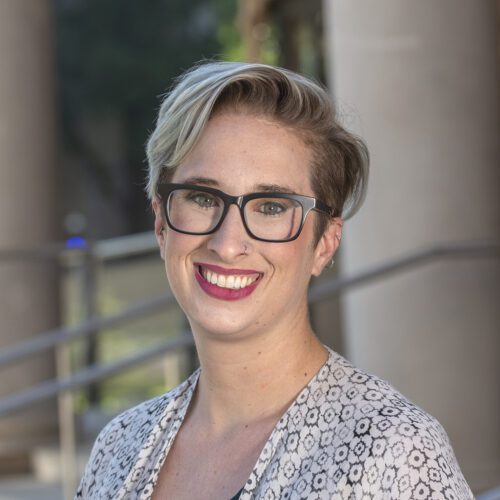LauraEllen Ashcraft, PhD, MSW (she/her) is an Assistant Professor of Epidemiology in the Department of Biostatistics, Epidemiology, and Informatics. She also serves as the Associate Director of the Dissemination & Implementation Science Core at the Center for Health Equity Research and Promotion (CHERP) at the Corporal Michael J. Crescenz VA Medical Center. Additionally, Dr. Ashcraft is the co-founder and Director Emeritus of the Pittsburgh Dissemination & Implementation Science Collaborative (Pitt DISC).
Dr. Ashcraft received her Master of Social Work at the University of Pittsburgh in 2013 with concentrations in Community Organizing and Social Administration. She completed her PhD in Social Work at the University of Pittsburgh in 2021 with a focus on implementation science in chronic pain management in primary care settings. Her dissertation work involved the development of a novel strategy to quantify implementer concordance.
In this Q&A, LauraEllen Ashcraft reflects on how her work in implementation science addresses real-world challenges in health care, the experiences that led her from social work to research, and how interdisciplinary collaboration and equity remain central to her work and community within DBEI.
Can you tell us about your current research and what inspired you to pursue this area?
My research bridges the gap between what we know works and what actually gets done in practice, especially to advance equity. I focus on hybrid trials, pragmatic methods, and tailored implementation strategies that help integrate evidence-based practices into real-world settings facing staff burnout, resource constraints, and systemic inequities.
What drew me to this work was my early experience in social work with adults facing serious mental illness and homelessness—seeing firsthand how hard it was to sustain meaningful change. Later, as a research coordinator and project manager on multiple critical care studies on telemedicine and long-term acute care hospitals, I realized we often struggle not with what works, but how to reliably make it happen. That insight drives me to ensure implementation research truly impacts care delivery and reduces disparities where it matters most.
How does your research intersect with real-world challenges?
My research exists at the intersection of evidence and practice, pursuing the persistent gap between what we know works and what is actually implemented—especially in under-resourced settings.
By advancing hybrid trials, pragmatic designs, and equity-informed frameworks, I help providers, clinics, health systems, and communities to integrate evidence-based practices into real-world contexts where constraints like staffing, burnout, and systemic inequities are daily challenges.
Whether it’s optimizing maternal health or chronic disease care, or refining dissemination strategies for policymakers, my work is driven by a core goal: to ensure implementation efforts are not just rigorous, but sustainable and equity-enhancing across diverse health and human service environments.
What do you find most rewarding about working in the Department of Biostatistics, Epidemiology and Informatics?
I enjoy the interdisciplinary nature of DBEI. The exposure to other disciplines has led to innovations in my own work. For example, I’ve submitted a grant examining the field of implementation science using methods found in informatics (partnering with Drs. Romano and Mowery). I’m also working on a paper examining potential alternatives to stepped wedge trials (a commonly used method in implementation science) with Dr. Stephens-Shields. These collaborations help to expand my thinking and bring approaches from other disciplines to innovate in implementation science.
Can you share a significant recent project, publication, or professional recognition that you are particularly proud of contributing to or achieving?
I am a proud member of AMTHEST@Penn which seeks to support research at the intersection of implementation science and maternal health. This project, funded through the NIH IMPROVE Initiative, takes a different approach in that it focuses on the researchers who are doing their own research projects. We currently support 10 Centers of Excellence (U-level grants) and 4 community implementation projects who are all doing important work in addressing the maternal health crisis.
My role in AMETHIST@Penn, I provide implementation science expertise and support to partners. We are also conducting some metascience research to understand the factors that impact the ability to conduct research at the maternal health and implementation science. This work has had a powerful impact on the way I think about community partnerships and implementation science. I am so thankful for our staff, community partners, co-investigators, and colleagues across the country who are working diligently on this important work.
What advice would you give to students or early-career professionals in your field?
The field of implementation science is vast and there are infinite opportunities for collaboration and scholarship. Take your time to learn the basics and then keep an open mind about where there may be opportunities for you to learn and integrate other prospectives. Finally, listen. Listen to elder scholars and community members. Communities often know how what factors impact their ability to implement an innovation. Listen to communities and they will tell you how to proceed.
What is an interest or pastime that you enjoy outside of academia?
I am a massive fan of Brighton and Hove Albion Football Club who play in the English Premier League. I’m the current President of the Stateside Seagulls, the official US supporters group for Brighton and Hove Albion. I also support the Pittsburgh Riverhounds (men) and the Pittsburgh Riveters (women) after living in Pittsburgh for 9 years. I enjoy gardening and plants. My home office is filled with plants and my garden. Outside, I grow tomatoes, basil, and this year am trying zucchini.
